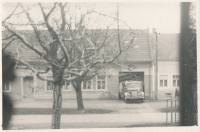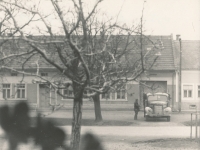My parents resisted joining the cooperative farm until 1958
Download image
Eva Minksová, née Supová, was born on 11 December 1940 in a peasant family in Velká nad Veličkou. Her father Cyril Sup managed one of the largest farms in the village. Eva had three siblings, but one of them died when in their youth. When the collectivisation of the countryside began, the family was labelled a kulak family. Cyril Supa’s farm was subjected to large delivery obligations, which were ever increasing. However, he resisted joining the cooperative farm for many years, and in 1958 a final action was taken in which the Sups’ crops and most of their livestock were confiscated; some parts of the farm were sealed. Cyril Sup was taken into custody and imprisoned in Uherské Hradiště and then in Brno, from where he returned home weakened. After his convalescence, he she earned his living with construction work. As the daughter of a kulak, Eva was also persecuted and could not find employment. Eventually, she was allowed to work at the Moravian Centre (cooperative of art production) in Gottwaldov (now Zlín) and at the sawmill in Velká nad Veličkou. During the 1960s, Eva Supová met Miroslav Minks from nearby Kněždub and got married. Like her father, her husband had been imprisoned for political reasons. In his native village he founded the Orel physical education union and in 1948 he tried to carry out actions against the communist regime. He was imprisoned and sentenced for distributing protest leaflets. He served the first years of his sentence in the prison in Uherské Hradiště. He was then interned, among other things, in the Jáchymov labour camp, where he worked as a miner. His sentence was increased to life imprisonment for a failed escape attempt. In total, he served over 10 years, of which almost 4 years in solitary confinement. After an amnesty in 1960, Minks returned to his native region. He trained as an electrician. He occasionally helped as a translator at folklore festivals in Strážnice. After the political loosening in 1968, he started his own business and co-founded an office for construction projects, which was, however, liquidated by the state authorities with the onset of normalisation. Miroslav Minks was subsequently arrested again in 1969 and remained in prison for another 4 years.









